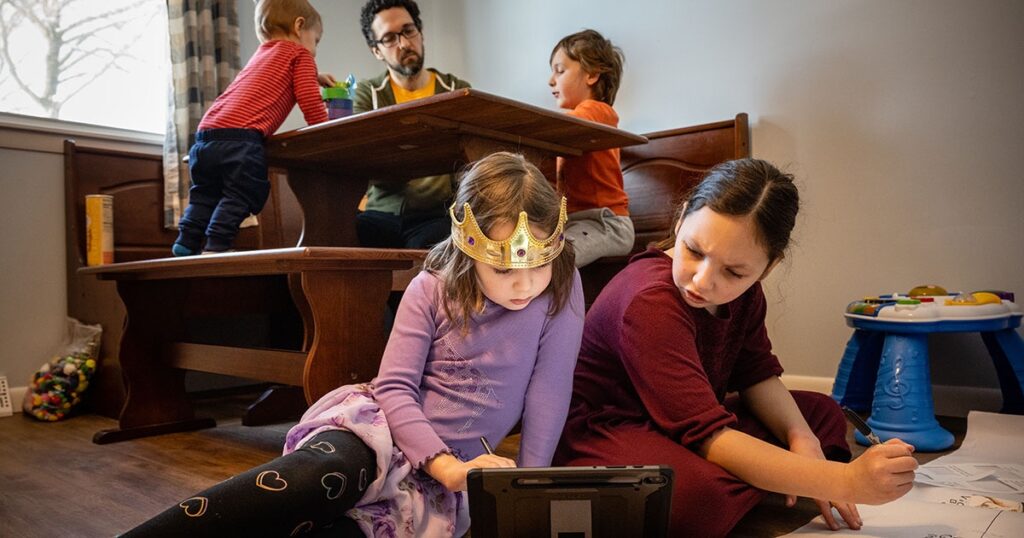The COVID-19 pandemic has caused a surge in homeschooling, a development that presents new opportunities for Lutheran churches and auxiliary ministries to carry out the mission of making disciples.
The number of American families homeschooling doubled in a single year, from 5 percent in 2019 to 10 percent in 2020, according to a Gallup poll taken in August. The increase in homeschooling revealed in the poll does not include students who remain enrolled in a conventional school through distance learning, rather it includes only those “not enrolled in a formal school, but taught at home.”
The surge may be even larger. Federal education data typically puts the percentage of homeschooled children at 3 percent, according to Education Week, but this year saw the percentage quadruple, with another “nine percent of parents who weren’t home schooling their children last school year [saying] they planned to home school their children at least some of the time this school year.” Education Week says accurate numbers are hard to quantify as “home schoolers are a difficult bunch to track.”
Public school attendance declines
Whatever the real numbers, enough data is available to show a dramatic rise. In North Carolina, for example, 10,000 new families filed notice of their intent to homeschool in July and August, compared to just 3,500 new families the previous year.
Public school attendance has dropped to 76 percent of school-aged children, which mirrors a sharp drop in parents’ satisfaction with their child’s education, which fell from 82 percent in 2019 to 72 percent in 2020, according to Gallup.
The poll was taken in the summer, as school districts were scrambling to implement protocols for COVID-19. Concern over the effectiveness of remote schooling “has no doubt contributed to the uptick” in homeschooling, according to Gallup.
Students not attending public schools include, in addition to homeschools, 6 percent enrolled in private schools, 5 percent in charter schools and 2 percent in parochial schools, including schools of The Lutheran Church—Missouri Synod. The impact on enrollment in Lutheran schools is not yet known as the LCMS School Ministry Office is still compiling statistics for the current school year. Unrelated to the pandemic, the LCMS has seen the closure of hundreds of Lutheran schools in recent decades. The 2020–21 Lutheran Schools Statistics Report, once published, will provide a picture of how COVID-19 has affected the trajectory.
The switch to homeschooling continued during the fall 2020 semester. Many parents, seeing their children frustrated by the process of ever-changing protocols as school districts wrestled with the pandemic, elected to pull their children mid-semester to homeschool. Most of the evidence of this is anecdotal as no comprehensive studies are yet available.
More parents are expected to join the homeschool ranks for the second semester of the 2020-21 school year. But for some families, the decision to homeschool is temporary — emergency homeschooling until the pandemic has passed.
Ministry opportunities
The rise in homeschooling provides a ministry opportunity for churches, parochial schools, camps and other church-related ministries to serve in new ways. Lutheran schools can assist with curriculum and testing, as well as open sports, music and other extracurricular activities to homeschooled children. Lutheran churches without schools can enlist retired teachers to mentor homeschooling parents.
Lutheran camps, which were already serving homeschooling families in varying degrees, are further expanding that ministry, combining outdoor education with the Gospel message. Outdoor education points to the Creator through exploration of His marvelous creation; reveals the consequences of the fall through the startling cruelty of nature; and paves the way for the children to hear the Gospel, that is, of their need for a Savior in a fallen world.
Christian education — particularly at home with parents as teachers — has long been a fundamental value of the Lutheran church. Martin Luther instructed his own children at home and prefaced the Small Catechism with, “As the head of the family should teach them in a simple way to his household.” The decline in Lutheran school enrollment, coupled with the rise in the number of homeschooling families, provides a “new” means to preserve the church’s rich educational heritage through this transition back to a centuries-old mode of instruction.
This ministry window may be brief for many families, whose children will return to public schools once the pandemic threat is over. But other families new to homeschooling may well find that it best serves their children’s needs — and that decision could be made in part because of services provided by Lutheran ministries.



I appreciate the article and I appreciate the ideas for what churches and LCMS schools can do to reach out to homeschool families. Having homeschooled our children for more than a decade, I think we’ve seen an attitude shift where our Lutheran schools are beginning to look at homeschooling, not as a threat or as competition, but as an opportunity for outreach. Many homeschool parents out there are constantly looking for resources, quite often in one or two areas, particularly for things that are pretty hard/impossible to do at home alone (such as band, choir, etc.) There is a multitude of opportunity here for the Synod, for Concordia Publishing House, for Lutheran Education Association, etc.
Youth ministry is so important for bringing families to Christ and building the future of the church. Sadly, our LCMS church has suspended youth (Sunday school, Little Worship, use of a nursery room, etc) since pandemic began until at least after Easter. Adult studies, Sunday school, is available though. As a pre pandemic homeschool mom of 7 children 12 years down to 1 year it makes us not feel as welcome or supported. Take home or during sermon packets for children would be a simple place to start.